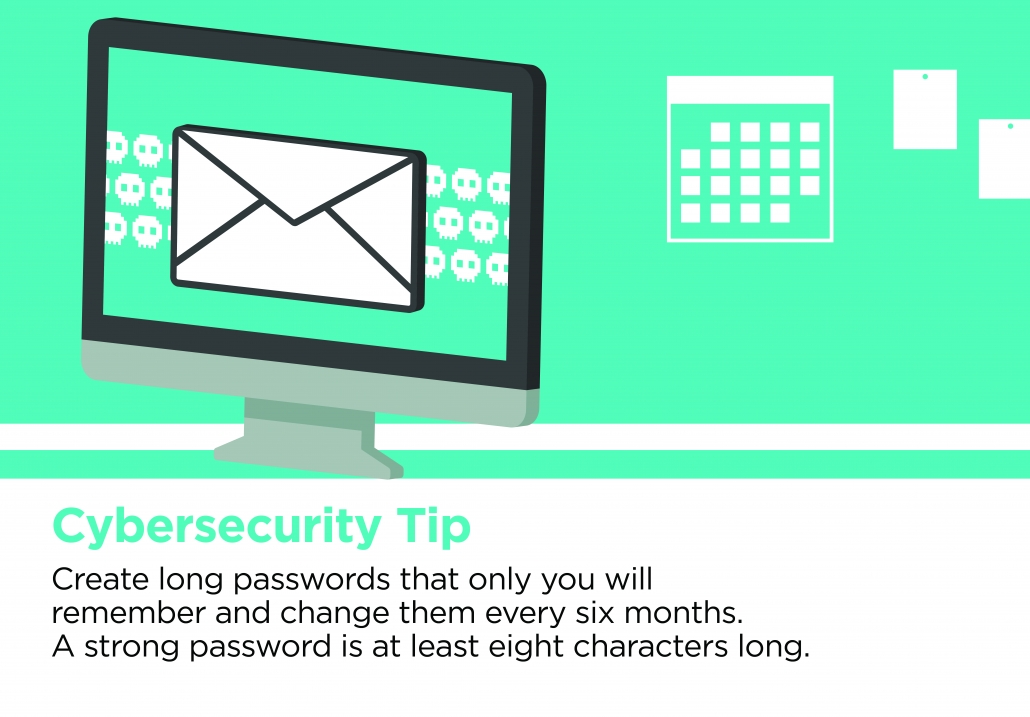Four Ways to be Cyber Safe
We all know the internet can be dangerous and scary, and we’ve all seen the lists of ideas for better cybersecurity.
The problem is, cybersecurity tips aren’t helpful unless we act on them. Sure, we should use long passwords and change them regularly—but will we really do that?
This article includes four tips for making yourself safer from cyber scammers and hackers, but first, let’s look at a few reasons that might encourage you to put those tips into action.
Be afraid. Be very afraid. Bad things really can happen on the internet. A smooth-talking con artist on the end of the phone can charm or bully you into revealing your Social Security Number or credit card number, or malware can monitor your keyboard and capture your password to your favorite website. Criminals use this information to access your credit cards and bank accounts, especially if you use the same password for multiple accounts. Children can also be victimized by cyberbullying. Think about what’s on your computer or your smartphone that you don’t want to lose or give away. Keeping those dangers top of mind can help motivate you to take small steps to prevent them.
Make your own rules. When you see a good cyber safety tip but don’t think you’ll really take the advice, figure out a way you might be able to put it into action. Maybe you’re the kind of person who pays attention to a reminder note on your refrigerator. Maybe you know you won’t keep track of different passwords on all your internet-connected devices, but you might be more likely to regularly update a strong password on the server in your home—that can be a good option if all your connections are coming through that one point of entry.
The time is now. Experts warn of a triple-threat these days. First, scammers are taking advantage of COVID-19 uncertainty, from offering phony cures and tests, to promises of financial assistance. Second, with more people working from home due to social distancing, there may be fewer office-based security measures in place. Third, the FBI warns that increased use of mobile banking offers more chances for cybercrime. And if you’re the sort of person who thinks in terms of months, October is Cybersecurity Awareness Month, which can be a great time to act on this year’s theme, “Do your part #BeCyberSmart—If You Connect It, Protect It.”
So, here are four cybersecurity tips to keep you safe:
Use strong passwords
And change them regularly—many sites and apps make that easy to do by clicking on the “forgot your password” link. The best passwords are at least eight characters and include different types of characters—try using a memorable verse from your favorite song and adding a few numbers and special characters, ($ ! _ &) or even a space. If you are like most people, remembering all your passwords is a challenge. Chose a security option based on the value of what you’re protecting. The options you use to secure your bank and retirement account passwords might be different than how you store your social media passwords. Password apps keep them in one place and may be a great option for some passwords, but you can be in big trouble if you forget the password that lets you into that app. Keeping passwords on paper or a in notebook might be more secure than using the same password for everything, depending on how secure and hidden that paper is from other people at the office or kids at home.
Install software updates
Your apps and operating systems will periodically send updates. Install them—they often include protections against the latest security threats. But remember, those updates come from the apps and not from emails or social media notices. An email containing an update may be a scam—instead of clicking on the link, go to the app’s website to see if there really are updates available.
Use two-factor authentication
That phrase is just a fancy word for a technique that adds an extra layer of security in addition to a password. Banks increasingly use this system—when you try to connect with them, the bank may text a code number to your phone that you type in to complete the sign-in process for your account. Keep in mind that answering a security question is similar to having a password––both are something you know. Answering a security question won’t provide the same level of additional security as that of a second factor. A second factor will be something you have, like your phone to receive a passcode, or something you are, like a biometric fingerprint, in addition to something you know, like a password or security question.
Think before you click
Be wary of any offer or link that comes through the internet, whether by email or social media, or even a phone call instructing you to get online. Don’t click on a link unless you know for certain what it is. Ideally, you should be expecting to receive the link. Even emails from friends should be suspect—hackers can impersonate someone you know to send a link or an attachment—both can result in you downloading malware that can take control of your computer in ways you may not even be able to detect. If you have any doubt, whether it’s a link to a software update or an attachment to a funny cat video, give the sender a phone call to find out if they really sent it or if it’s a scam.
To take advantage of the great promise of the internet, we must also recognize the peril. These are relatively simple steps you can take now to keep yourself reasonably safe.





